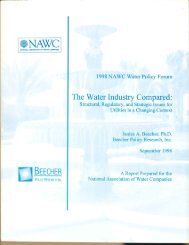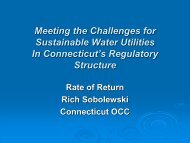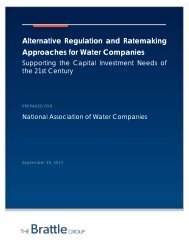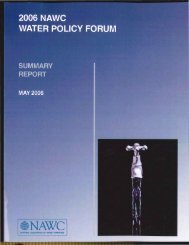CENTER FOR URBAN POLICY AND THE ENVIRONMENT - NAWC
CENTER FOR URBAN POLICY AND THE ENVIRONMENT - NAWC
CENTER FOR URBAN POLICY AND THE ENVIRONMENT - NAWC
You also want an ePaper? Increase the reach of your titles
YUMPU automatically turns print PDFs into web optimized ePapers that Google loves.
Indiana University + School of Public & Environmental AffairsCenter for Urban Policy & the EnvironmentIV. The Future of Traditional Economic RegulationThe century-old traditions of economic regulation are evolving for each of the regulatedindustries. Many states are rapidly moving toward new regulatory models, including deregulationof services when competition is sufficiently established. The traditional ratebase/rate-of-returnform of regulation seems to be waning. A key issue today is whether the traditional model will bepreserved for any of the utility industries, including the water industry. Even though the waterindustry may not exhibit the same pattern of economic or technological evolution as the otherindustries, changes in economic regulation that will affect the water industry seem to beinevitable.One Perspective onPerformance RegulationAccording to a recent Wall Street Journal article,former California regulator Daniel Fessler"predicts that in seven years most Americans willbuy electricity from companies that are regulatedon performance. Argentina's system, whichalready doles out finanCial rewards andpunishments this way, has thus become a windowon the future of the U.S. power industry." TheArgentina model, .in what Fessler calls a "devilishlysimple idea," "Regulators cap rates on what thedistribution companies can charge customers andlet them keep a fat share of what they save belowthe cap. Customers save because the cap istightened every five to eight years, afteradjustments for inflation" (Friedland and Holden,"Power Structure," Wall Street Journal, June 19,1996).regulation provides a means of diffu.sing responsibility for rising rates.A frequent speculation is that waterutilities will be the last of the regulated utilitymonopolies. The relatively few state commissionstaff members working in the water field wonderif someone will "leave the lights on for them," asthe doors to regulation close. Some arguments infavor of maintaining some aspects of traditionaleconomic regulation for water utilities can bemade. Water is a rising-cost industry, so duediligence is required to ensure that investmentsand expenditures are prudent and in the publicinterest. Regulators can use a variety of tools toprovide checks and balances on utilitydecisionmaking. In many respects, utilityregulation legitimizes the ratesetting process. InIndiana, for example, 131 municipal waterutilities are regulated by state commissionvoluntarily. State review helps justify the rate tothe public. For the local elected official, stateAnother argument in favor of economic regulation stems from a frequent criticism of thetraditional ratebase/rate-of-return form. It has been widely held, although sometimes debated,that traditional regulation provides utilities with incentives to overinvest in the utility system inorder to build a rate base on which a return is earned. 12 For the water industry, underinvestmentmay be more of a problem. It is widely held that investment in the nation's water supplyinfrastructure will be greatly needed for replacements, improvements, and extending service intogrowth areas. More private capital, supplied by investor-owned utilities, may be needed in lightof the constraints on public (government) capital. Regulation can help ensure a return onprudently invested capital. Critics could argue, however, that some of the alternatives to rate baseregulation can be designed to provide appropriate incentives for investment as well.12This is known as the Averch-Johnson effect.12
















